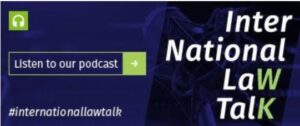Welcome to the third post in the series of International Law Talk. In this series of podcasts, Wolters Kluwer will bring you the latest news and industry insights from thought leaders and experts in the field of International Arbitration, IP Law, International Tax Law and Competition Law. Here at Kluwer Arbitration Blog, we will highlight the podcasts focused on international arbitration.

In the third podcast of the series, Arie Eernisse, Assistant Editor for East and Central Asia of the Kluwer Arbitration Blog, interviews Chiann Bao, an independent arbitrator at Arbitration Chambers, based in Hong Kong. Chiann Bao is a former Secretary-General of the Hong Kong International Arbitration Centre (2010-2016) and is currently Vice President of the ICC Court of Arbitration and Chair of the ICC Commission Task Force on Arbitration and ADR. She is also the editor (with Michael J. Moser) of Managing Belt and Road Business Disputes: A Case Study of Legal Problems and Solutions (Wolters Kluwer, forthcoming 2021) and author of other books and articles.
Chiann Bao first reflects on the four main highlights of her multi-faceted career and then shares her insights on various relevant topics pertaining to international arbitration, including the following:
- an introduction to her forthcoming book, which involves a fact scenario based on actual transactions and chapters on major issues faced by parties in such transactions, such as arbitration and ADR in China, enforcement of arbitral awards in China, and issues arising from project finance, construction and investor-state disputes involving China or China-based entities;
- disputes arising from China-outbound investment in connection with China’s Belt and Road initiative. Bao explains that her new book is a follow-up to Managing Business Disputes in Today’s China: Duelling with Dragons (Wolters Kluwer, 2007), edited by Michael Moser, which focused more on issues arising from China-inbound investment transactions. Bao notes that the changed focus is reflective of changes in the flow of investment to and from China;
- the availability of arbitration awards from China and the work of China-based arbitral institutions;
- the work of the ICC Commission Task Force on Arbitration and ADR, which has involved addressing the issue of achieving more efficiency in arbitration through two specific mandates: (1) finding better ways to settle arbitration, observing the trends of settlement in arbitration and assessing what features of the arbitral process may facilitate settlement and (2) how to better utilize ADR, in general and in the context of arbitration. Bao notes that, considering the effects of the COVID-19 pandemic, it is an ideal time for the task force to be grappling with these types of issues; and
- Hong Kong’s evolution as an arbitral seat.
Offering her final thoughts and answering a question that we will pose to all interviewees in this podcast series, Bao predicts that there will be three main areas of change in the next five to ten years: (1) technology playing an increasingly important role, (2) a spreading out of seats, including in Asia, and (3) an increase in diversity.
Listen to the podcast ‘Arbitration in China’ with Chiann Bao.
Follow the coverage of the International Law Talk arbitration podcasts on Kluwer Arbitration Blog here.
________________________
To make sure you do not miss out on regular updates from the Kluwer Arbitration Blog, please subscribe here. To submit a proposal for a blog post, please consult our Editorial Guidelines.


